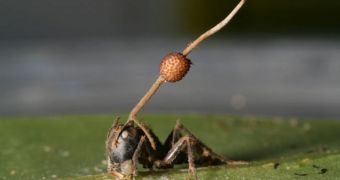Biologists say that, while humans have been struggling to achieve methods of exercising mind control over each other, the animal kingdom has been doing it for millions of years.
Scientists say that creatures controlling other animals' brains are not a new concept in nature. There are numerous cases in which this happens, even though not a single one involves humans.
But there are instances in which this cerebral control is exerted not by animals on animals, but by plants on animals, such as is the case with the fungus Ophiocordyceps unilateralis.
Experts say that this organism can single-handedly turn ants into zombies, forcing them to do whatever it wants. Most of the times, this means finding a good place to die.
The body of the ant then provides the fungus with everything it needs to grow, and repeat the cycle.
By analyzing scars left on a 48-million-year-old, fossilized leaf, experts now propose that the mind-controlling behavior is not a recent evolution, but that it appeared a very long time ago.
“I thought it was a very, very long shot to find such a fossil, but indeed, as luck would have it, two paleobotanists, Conrad Labandeira at the Smithsonian Institution in Washington and Torsten Wappler at the Steinmann Institute in Bonn, were sitting around wondering how that particular damage type might be explained,” says David Hughes.
The expert, who is a behavioral ecologist at the Harvard University, says that the leaf carries 29 scars centered on its veins, which look as if they were made by modern-day carpenter ants (Camponotus leonardi).
“We are now realizing that half of life on Earth is parasitic – each free-living organism has at least one parasite,” Hughes adds.
“But very few manipulate behaviors and there is a reason for that – it is likely very costly. The fossil now challenges us to think of what past environments acted as selective forces for such cool tricks to evolve,” he explains.
Details of the new discovery appear in the August 18 online issue of the esteemed scientific journal Biology Letters, LiveScience reports.

 14 DAY TRIAL //
14 DAY TRIAL //